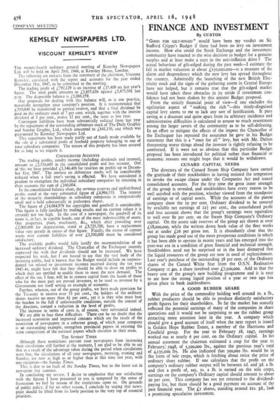FINANCE AND INVESTMENT
By CUSTOS
" GOOD FOR GILT-EDGED" , would have been my verdict on Sir Stafford Cripps's Budget if there had been no levy on investment income. How else could the Stock Exchange and the investment community have reacted to the wise decision to budget for a genuine surplus and at least make a start in the anti-inflation drive ? The actual behaviour of gilt-edged during the past week—I estimate the fall in market valuation at about L15o,000,000—is a measure of the alarm and despondency which the new levy has spread throughout the country. Admittedly the launching of the new British Elec- tricity stock and the signs of the gathering storm in Central Europe have not helped, but it remains true that the gilt-edged market would have taken these obstacles in its stride if investment con- fidence had not been shaken by this sinister Budget proposal.
From the strictly financial point of view—if one excludes the egalitarian aspect of " soaking the rich "—this thinly-disguised capital levy seems to me to lack any sort of justification. It puts saving at a discount and quite apart from its arbitrary incidence and administrative difficulties is calculated to arouse so much resentment among the larger savers of the community as to be self-defeating. In an effort to mitigate the effects of the impost the Chancellor of the Exchequer has repeated the assurance he gave in his Budget statement that this is a "once for all" levy, but with Mr. Dalton threatening worse things ahead the investor is rightly refusing to be comforted. If it were not so obvious that this particular Budget proposal has been introduced for political rather than financial or economic reasons one might hope that it would be withdrawn.
CUNARD CAPITAL NEEDS
The directors of the Cunard Steam Ship Company have earned the gratitude of their stockholders in having resisted the temptation to invoke the escape clause under the Companies Act and issued consolidated accounts. For the first time the great inner strength of the group is revealed, and stockholders have every reason to be well satisfied with the position, whether viewed from the standpoint of earnings or of capital assets. While the accounts of the parent company show the to per cent. Ordinary dividend to be covered by available net earnings of 22+ per cent., the consolidated profit and loss account shows that the group's earnings were equivalent to well over 8o per cent, on the Steam Ship Company's Ordinary capital. On the assets side reserves of the group are shown at over D8,000p00, while the written down book value of the fleet works out at under £26 per gross ton. It is abundantly clear that the group has made good use of the more prosperous conditions in which it has been able to operate in recent years and has emerged into the post-war era in a condition of great financial and technical strength. Stockholders need not be surprised or in the least dismayed that the liquid resources of the group are now in need of replenishment. Last year's purchase of the outstanding 38 per cent. of the Ordinary shares of the Cunard White Star from the O.S.N. Realisation Company et 4os. a share involved over £7,5oo,000. Add to that the heavy cost of the group's new building programme and it is easy to see how the strong liquid position of a year or two ago has given place to bank indebtedness.
A GOOD RUBBER SHARE
With the price of the commodity holding well around is. a lb., rubber producers should be able to produce distinctly satisfactory profit figures for their shareholders. So far the market has scarcely reflected the potential earnings of many of the companies in share quotations and it would not be surprising to see the rubber group attracting more attention later in the year. A company which should give a good account of itself when the next report is issued is Golden Hope Rubber Estate, a member of the Harrisons and Crosfield group. For the year to February 28, 1947 earnings worked out at nearly 6 per cent, on the Ordinary capital. In his annual statement the chairman estimated a crop for the year to February,\J948, of 5,500,000 lbs., against the previous year's total of 4,135,00k lbs. He also indicated that 500,000 lbs. would be in the form of 'sole crepe, which is fetching about twice the price of ordinary sheet rubber. If one calculates that the profit on the company's ordinary rubber output will be between 2d. and 3d. a lb. and that a profit of, say, Is. a lb. is earned on the sole crepe, earnings on the company's Ordinary capital should amount to about 20 per cent. This company has not yet returned to the dividend- paying list, but there should be a good payment on account of the past financial year. The £1 shares, standing around 21S. 3d., look a promising speculative investment.






























 Previous page
Previous page